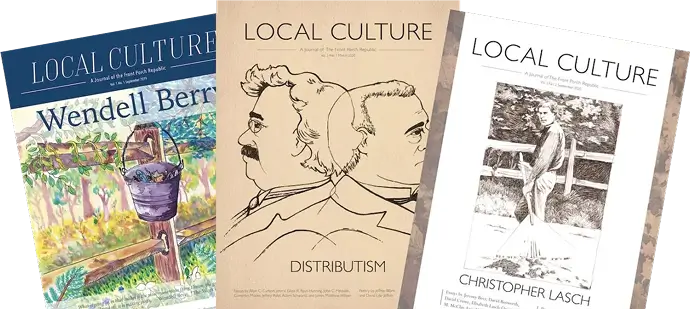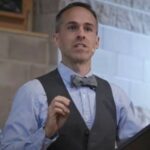The Blackboard 102
Forgetting vs. Overcoming: Nietzche on Abuses of History and the 1619 Project
The 1619 Project states that its purpose is to remember the history of slavery and racism that American schools have sometimes tried to forget. But mostly it teaches students the…
Diversity, Race, and Radical Hospitality in a Bible-based Community
We academics unfortunately often fall into the trap of pride (particularly of the self-involved, self-satisfying, institutional kind), and hence a humbling such as this conference delivered was probably much needed.…
Spaces for Speech on Today’s College Campus
Reviving campus newspapers and radio stations and student-led clubs, and putting resources behind them, could create more space for speech, help foster campus community, and model a level of comfort…
Liberal Learning for All: A Review of Rescuing Socrates
Montás deserves great credit for illuminating the perverse priorities of American higher education throughout Rescuing Socrates. It must be admitted, however, that the book suffers from occasional missteps. A fuller…
Pretend It’s a Book
Fran Liebowitz suggests that “a book isn’t supposed to be a mirror, it’s supposed to be a door.” Universities are the same. They are not meant to simply reflect the…
Fact’s Two Faces: On the Masking of Children at School
Life is ambiguous, murky, rife with situations that elude dogma’s capture. When the seas get rough, however, our tolerance of this is one of the first things hucked overboard. For…
The Contradictions within My Students’ Request for Diverse Curricula
The imagined student’s intentions are honorable: to promote racial justice. But when the conversation begins, she has already set herself against the teacher and the course. The task of the…
Why We Must Recover Thinking as a Practice
Thinking as a practice places a check upon the self. It offers us a way out of our "res idiotica." If our universities are faithful to their missions, they must…
Loving Education in the Time of COVID
The virus has given us many headaches, but it is also giving us an opportunity as we re-evaluate policies and practices and seek to care for one another and for…
An Education That Turns on Affection
Alex Sosler compares online and in-person education. Paradoxically, when we embrace the limits of our embodied existence and learn with and from particular classmates in a particular place from a…
Why I’m Fasting From Analogies
Education in the age of COVID is an opportunity for teachers and students to investigate the role of language in an intense real-world situation. Rachel Griffis considers the prevalence of…
The Face of Education
As a new school year begins, Jon Schaff takes stock of the effects of Covid on education. Learning is relationship, and, if the point of college, as the very term…
A Comedy with a Sad Ending: #MeToo and Pope’s Rape of the Lock
Daniel Ritchie explores how the #MeToo movement affects our reading of Alexander Pope's The Rape of the Lock. In turn, this comedy with a sad ending offers us a sense…
Teaching (or Cultivating) Sustainability (or Inhabitance), Ten Years On
As utopian as "religious education" and "local food tours" may seem, that doesn't mean we can't approach them with a hope for real formation work in mind.
Friendly Neighborhood Spider-Man: How to (Actually) Save Humanity
An empathetic approach to the kind of lofty goals named by Princeton’s aspiration to serve “humanity” might empower talented young people to serve their communities rather than selling out for…
Common Arts Education: A Review
In a world mediated through technology, the common arts bring us into daily encounters with a material world where we have not made the rules. They orient us to truths…
The Liberal Arts for Loss and Lament
The main posture of a liberal arts education is slowing down, rest, seeing. But if we just train students to only strive, reach, stretch for something more, then suffering will…
The Classroom as Sanctified Space: Human Formation away from the Screen
For the sake of human formation and flourishing, it is essential to carve out sanctified spaces of peace and refuge away from the mesmerizing pull of screens.
Teaching Banned Books: Huck Finn
The censorship of slavery no longer dictates Huck’s morality. Unlike Tom, Huck has begun to question his society’s standards, to weigh and consider what is just and right, and I…
Reading Petrarch’s Secretum with College Sophomores
When Petrarch uses Augustine to call himself out for being bound and dragged down by the “chains of love and glory,” students are forced to consider what it is they…
Education and Democracy in Disembodied Times: Emerson and Dewey on Humane Technology
In an age of knee-jerk innovation, the warnings articulated by Emerson and Dewey are more needed than ever. They advocated for applied knowledge, but they also insisted such technology must…
Poor Little Lamb
Colin Phelps is not the first to discover a graced thing in college: it’s the unchosen self-knowledge that is most liberating.
Why The Cult of Smart is a Book for Every Parent in 2020 (Whether Anarcho-Socialist or Not)
The Cult of Smart is deeply entrenched in most modern systems of public education around the world, and the increasingly clear reality of cognitive and genetic differences between different human…
The Battle Rages On: Eric Adler’s Battle of the Classics: How a Nineteenth-Century Debate Can Save the Humanities Today
We all want students to think critically and to reflect on what they have encountered in the course of their education. In order to do that, however, they must have…
















